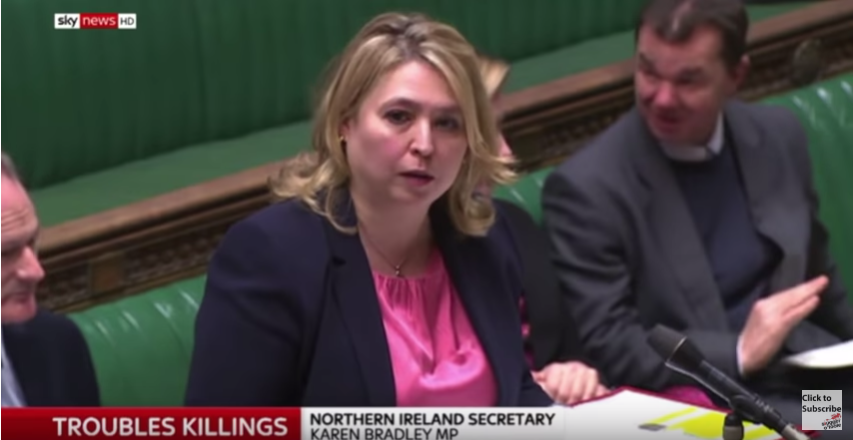Theresa May likes to talk about ‘our precious union.’ It’s clearly a buzzword somebody at Tory HQ dreamed up at meeting and wrote on a whiteboard. The Prime Minister repeats the phrase like a bot, often to reiterate the fact that Northern Ireland is part of the UK. Over the past few days, you could be forgiven for thinking that we’re living in a different world.
On the 5th March sixty two year old Tommy Morgan gave evidence at the Ballymurphy inquest. Sobbing, he recounted how he’d heard the cries of Joan Connolly, a mother of eight, after she’d been shot: “Someone help me please, I’m blind, I’m shot in the face, I can’t see.” Mr Morgan believes that Mrs Connolly was shot by British soldiers based in a nearby Memorial Hall.
The very next day, Karen Bradley was at the dispatch box in the House of Commons. After taking a question about legacy from the DUP’s Emma Pengelly, she said that, “Over 90% of the killings during the Troubles were at the hands of terrorists. Every single one of those was a crime. The fewer than 10% that were at the hands of the military and police were not crimes. They were people acting under orders and under instruction and fulfilling their duties in a dignified and appropriate way.”
As Bradley spoke, the other MPs around her chatted and talked. Some of them looked bored. It was a very quiet moment, jarring in in how it passed without fanfare. The inquest in Belfast may as well have been happening on another planet.
The Secretary of State was standing in the same place as David Cameron when he issued an apology for Bloody Sunday, an apology that followed the Saville Inquiry. Her comments come as the DPP is considering whether to prosecute the soldiers involved.
Bloody Sunday and Ballymurphy are high profile cases involving the Army but there are other incidents that have caused hurt and pain. In April 2018 an inquest ruled that a soldier wasn’t justified in shooting Marian Brown, a pregnant teenager, as she embraced her boyfriend in Belfast. In February this year, the Attorney General ordered an inquest into the death of Patrick McElhone, an unarmed man with severe learning difficulties who was shot in the back by a soldier in Pomeroy.
The reaction to the Secretary of State’s comments from political unionism has been weak, to put it lightly. The Ulster Unionist Party’s Doug Beattie, a former solider himself, called for Bradley to apologise and has acknowledged that her comments were hurtful. Some don’t think his comments went far enough but they are better than the measly words offered by others.
A few hours after Bradley’s statement and later clarification the DUP’s Sir Jeffrey Donaldson gave a two line statement that said, “We have been involved in discussions with the Government to support our veterans, against the witch hunts against them. However no one should be above the law and all innocent victims deserve justice.” Sammy Wilson addressed the issue on the 7th March and said that, “…of course soldiers and police officers who served in the Troubles must not be above the law” but the majority of his comments were directed at Sinn Fein.
Political unionism has failed to grasp the gravity of what Bradley said. The fact that she spoke while a decision with the DPP is pending. The fact she has raised further doubts about the government’s commitment to the Stormont House Agreement and sowed mistrust. While a former member of her party apologised for Bloody Sunday, she implied that the people involved acted in a “dignified and appropriate way.” More than anything, there was little recognition that Bradley’s words have caused hurt to the Ballymurphy and Bloody Sunday families. Even now, as people call for the Secretary of State’s resignation, few are saying anything more than they already have. It isn’t good enough.
Some people from a unionist, protestant background find it hard to criticise the state; their identity is bound up with it. Many, including me, have friends and relatives that served in the Army and the security services during the Troubles. Those same friends and relatives put their lives at risk when they put on their uniform. Considered legitimate targets by the IRA, many families lived day to day worrying that their loved ones would not come home. Three hundred members of the RUC were murdered during the Troubles along with hundreds of soldiers and UDR.
For some, admitting that the state did something wrong means giving ground to the IRA and the organisation’s justification for violence. I think it’s possible to acknowledge that certain state actions were unjustified, criminal even, without legitimising anything the IRA did. Doing that doesn’t and shouldn’t tarnish the service of our friends and relatives.
Many have issues with the legacy process and are rightly angry that victims of terrorism are still waiting for answers and justice. That isn’t a reason to give piecemeal soundbites about Bradley’s words or, as some have suggested, relish in the moment just to spite others. Moments like this call for something more. Time will tell whether anybody has the backbone to do anything.
Sarah is a writer and lawyer from Belfast.
Discover more from Slugger O'Toole
Subscribe to get the latest posts to your email.

